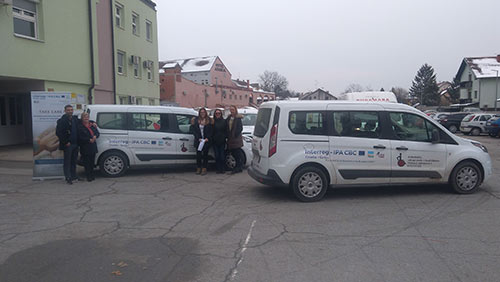Across the European Union, many rural areas have ageing populations, emigration of young people, poor infrastructure and unequal distribution of resources. This often means that vulnerable groups, such as the elderly, terminally ill, and the disabled, lack health and social services. The Take Care! project, covering Vukovar-Srijem county in Croatia’s Continental Croatia region, and the Srem district in Serbia’s Vojvodina region, addressed this by improving the quality of, and access to, palliative care.
- 30 January 2020
We set up the Take Care! project because in a ‘socially sensitive society’, how someone spends the last moments of their life matters a great deal. With our project, we have tried to ignite a spark that will further develop palliative care in Vukovar-Srijem and Srem counties. We believe that we successfully met our aims and have made a difference to people’s lives.
Thanks to close cross-border cooperation, seven mobile palliative support teams were set up in Vukovar-Srijem county, and a new palliative care ward for terminally ill patients in the Sremska Mitrovica General Hospital in Serbia. In the course of the project, a total of 968 patients received care from the multidisciplinary teams.
Training and networking programmes were organised for health and social workers, to develop skills and knowledge in palliative care, and to promote sharing of best practices.
Catching up on palliative care provision
Palliative care in Croatia had been improving since changes to the national law in 2014 that allowed such care to be provided and funded within the national healthcare system. However, progress was slow and specialist education lacking for those employed in specialised palliative care services.
To fill this need, 40 health and social workers received specialist training in palliative care, in collaboration with the project partners and the School of Medicine at the University of Zagreb. Activities focused on increasing and strengthening their competencies and establishing networks for mutual exchanges of experience, knowledge and best practices.
The focus on human capital ensured that not only was the Take Care! project a success, but that a strong foundation was built for the future of palliative care in the region. The project raised awareness about the importance of social responsibility in general, and initiated wider interest in raising the quality of life of vulnerable groups in Croatia and Serbia, to levels similar to those in other EU countries.
Cross-border cooperation for real and sustainable change
The project brought together five partners from Croatia and Serbia, including organisations who already worked closely with the target groups, such as the Bubamara Association of Persons with Disabilities and the Ilok Nursing Home in Croatia, and the General Hospital and humanitarian charity Caritas in Sremska Mitrovica, Serbia.
The partners’ first-hand experience, complemented by further consultation with members of the target audience and their families, meant the project was able to identify and address the real needs of vulnerable groups on both sides of the border.
Working together on this project established and developed important inter-sectoral relationships and reinforced the common border-region identity. And as well as setting up mobile healthcare units and a new palliative care ward, the collaboration resulted in numerous policies and strategic documents dedicated to developing health and social services in palliative care.
Total investment and EU funding
Total investment for the project “Take Care!” is EUR 921 708, with the EU’s European Regional Development Fund and Instrument for Pre-Acession Assistance II contributing EUR 783 454 through the Interreg IPA Cross-border Cooperation Programme Croatia – Serbia 2014-2020. The investment falls under the priority “Improving the quality of public social and health services in the programme area”.

